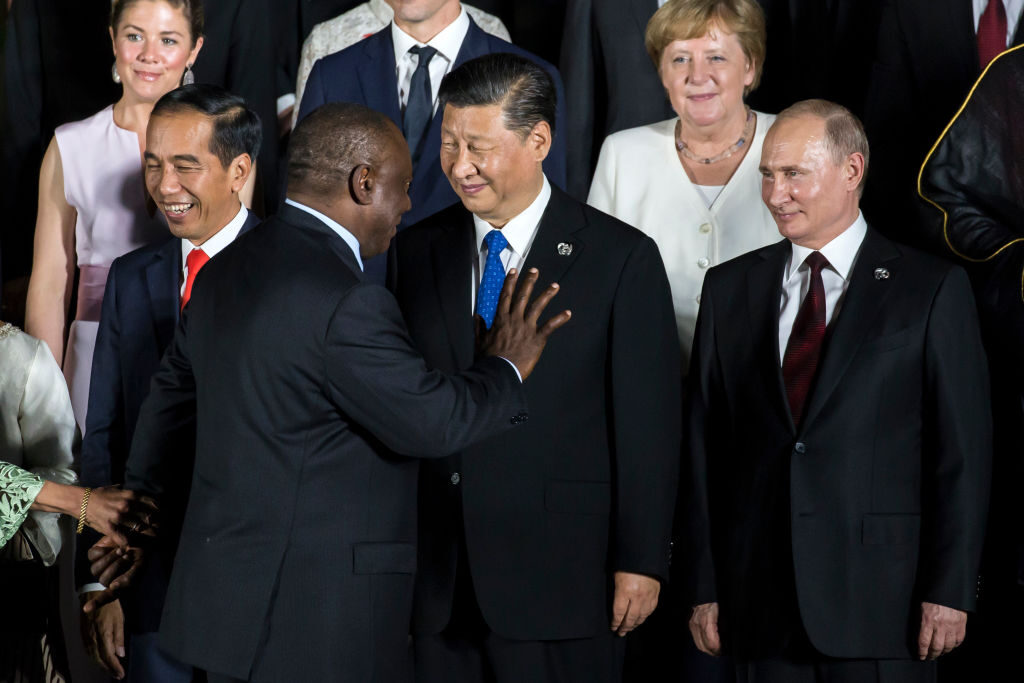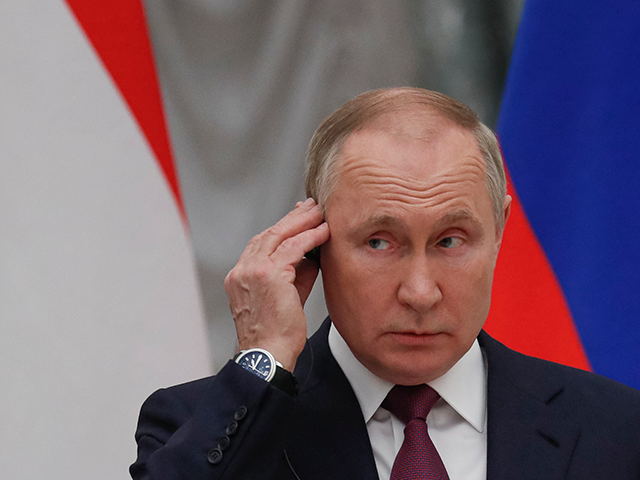The government of South Africa published a notice on Monday that it would grant diplomatic immunity to all attendees of the BRICS summit in August.
The notice immediately captured international attention because one of the scheduled attendees is Russian leader Vladimir Putin.
The International Criminal Court (ICC) issued an arrest warrant for Putin in March and South Africa is nominally obliged by treaty to enforce it.
BRICS is an economic alliance made up of Brazil, Russia, India, China, and South Africa. The BRICS nations, which were five of the fastest-growing economies in the world when the alliance was incorporated in 2009, aspire to create non-Western alternatives to institutions such as the World Bank and International Monetary Fund (IMF).
The ICC was established with a treaty called the Rome Statute of 1998 and went into operation after 60 nations ratified the treaty in 2002. The number of signatories has doubled to 120 over the ensuing two decades.
South Africa was one of the original 60 nations that ratified the Rome Statute. South African President Cyril Ramaphosa restated in April 2023 that his country remains an active participant in the ICC, after a moment of confusion when he said South Africa was planning to withdraw from the court because it wanted Putin arrested if he attended the BRICS summit in Johannesburg in August.

File/South Africa’s President Cyril Ramaphosa (2-L) waves as he walks past China’s President Xi Jinping (C) and Russia’s President Vladimir Putin (R) during a family photo session in front of Osaka Castle at the G-20 summit on June 28, 2019 in Osaka, Japan. (Tomohiro Ohsumi/Getty Images)
South Africa previously threatened to withdraw from the ICC under similar circumstances in 2016, when the court issued an arrest warrant for deposed Sudanese dictator Omar al-Bashir on charges of genocide. Bashir hastily departed South Africa before its high court ruled the arrest warrant against him was legal and enforceable.
In both cases, critics of the South African government’s position pointed out that the Rome Statute stipulates members must continue to enforce ICC warrants for 12 months after withdrawing, so the arrests of Bashir and Putin would still be required.
The ICC issued an arrest warrant for Putin and one of his top officials, Maria Alekseyevna Lvova-Belova, in March 2023. Both were charged with “the war crime of unlawful deportation of population” from occupied Ukrainian territory into Russia – specifically, thousands of children kidnapped by invading Russian forces and shipped to Russian turf under the authority of the Russian Federation’s Commission for Children’s Rights, which Lvova-Belova heads.
According to the Ukrainian government, Russian soldiers seized some of the children taken to Russia from orphanages. In other cases, the officials forced their parents to “consent” to their deportation or killed them when they resisted.
“It is forbidden by international law for occupying powers to transfer civilians from the territory they live in to other territories. Children enjoy special protection under the Geneva Convention,” ICC President Piotr Hofmanski said when the warrants were made public.
“This is an important moment in the process of justice before the ICC. The judges have reviewed the information and evidence submitted by the prosecutor and determined that there are credible allegations against these persons for their alleged crimes,” Hofmanski said.
Russia is not a signatory to the Rome Statute (nor is the United States) so Putin would theoretically be able to travel safely to any country that does not enforce ICC warrants. In practice, he has made only one trip outside Russia since launching his invasion of Ukraine, a visit to Iran last July.
Putin’s scheduled trip to South Africa became a major test of the ICC’s authority and the Ramaphosa administration’s commitment to its Rome Statute obligations. On Monday, the South African government punted by quietly publishing a notice in its official gazette that said the government would extend protection from its Diplomatic Immunity and Privileges Act to all of the foreign officials attending both the meeting of BRICS ministers in Cape Town on June 1 and 2, and the BRICS summit in Johannesburg from August 22-24. The latter is the event Putin is expected to attend.

File/South African President Cyril Ramaphosa, right, shakes hand with Chinese President Xi Jinping after a joint press conference at the government’s Union Buildings in Pretoria, South Africa, Tuesday, July 24, 2018. Jinping is in the country to attend the three-day BRICS Summit starting Wednesday in Johannesburg. (AP Photo/Themba Hadebe)
Senior South African officials told CBS News on Tuesday that Ramaphosa’s government has been poring over the precise wording of the Rome Statute, looking for “a possible loophole that would enable Putin to attend without South Africa having to arrest him.”
Evidently, they believe they found their loophole by extending diplomatic immunity to Putin because the Rome Statute stipulates that ICC warrants cannot be enforced if they would “require the requested State to act inconsistently with its obligations under international law with respect to the State or diplomatic immunity.”
Putin would, in theory, have to decline South Africa’s offer of immunity before the ICC could oblige the Ramaphosa administration to arrest him. Kremlin spokesman Dmitry Peskov waved aside the necessity for even this threadbare legal maneuver on Tuesday, dismissing the ICC warrant for Putin’s arrest as “illegal.”
South Africa’s primary opposition party, the Democratic Alliance (DA), on Tuesday requested a court order that would require Putin to be “detained” and “surrendered” to the ICC if he attends the BRICS summit.
“The DA is seeking this declaratory order to ensure that there is no legal ambiguity relating to the procedure to be followed, and the obligations placed upon the state, should President Putin set foot in South Africa,” said DA Shadow Justice Minister Glynnis Breytenbach.
Breytenbach referred to the 2016 controversy over Bashir’s visit and said it was important for the courts to rule before Putin arrives.
The South African Foreign Ministry appeared to tentatively backpedal on Tuesday, stating that the notice of diplomatic immunity for BRICS attendees was a “standard” procedure that does not necessarily “override any warrant that may have been issued by any international tribunal against any attendee of the conference.”

COMMENTS
Please let us know if you're having issues with commenting.